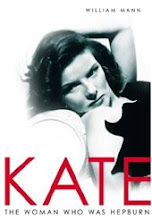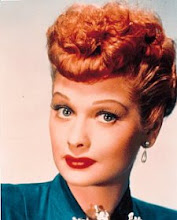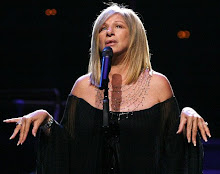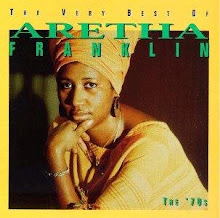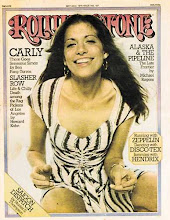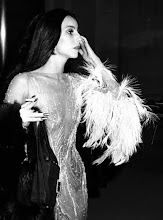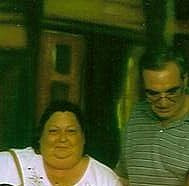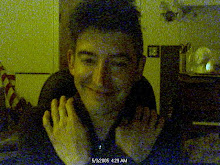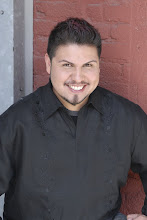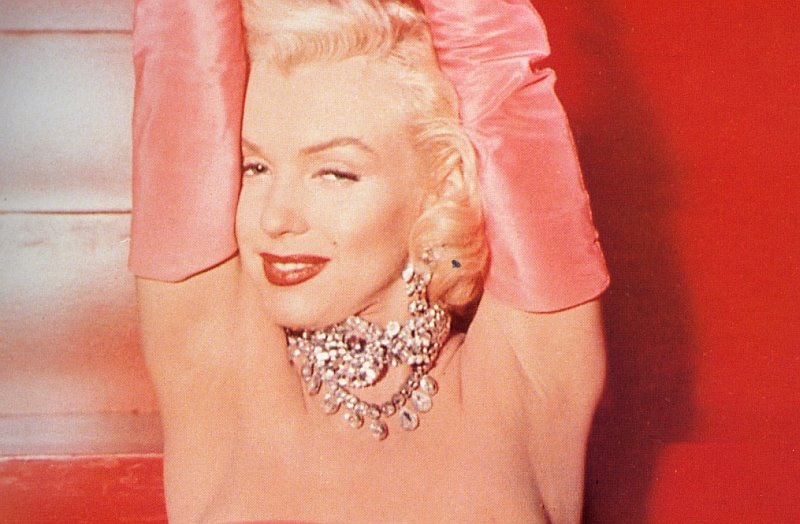Wednesday, June 30, 2010
SUSAN HAYWARD & LENA HORNE born on this day...
I was unique in that I was a kind of black that white people could accept. I was their daydream. I had the worst kind of acceptance because it was never for how great I was or what I contributed. It was because of the way I looked.
[quoted in Brian Lanker's book "I Dream A World: Portraits of Black Women Who Changed America", New York: Stewart, Tabori & Chang, 1986)] My own people didn't see me as a performer because they were busy trying to make a living and feed themselves. Until I got to café society in the '40s, I didn't even have a black audience and then it was mixed. I was always battling the system to try to get to be with my people. Finally, I wouldn't work for places that kept us out . . . it was a damn fight everywhere I was, every place I worked, in New York, in Hollywood, all over the world.
You have to be taught to be second class; you're not born that way.
It's not the load that breaks you down, it's the way you carry it.
Always be smarter than the people who hire you.
A little nepotism never hurt nobody, honey. If you got it, use it. Press on with it. Remind them of it.
In my early days I was a sepia Hedy Lamarr. Now I'm black and a woman, singing my own way.
On love: Don't be afraid to feel as angry or as loving as you can.
My identity is very clear to me now, I am a black woman, I'm not alone, I'm free. I say I'm free because I no longer have to be a credit, I don't have to be a symbol to anybody; I don't have to be a first to anybody. I don't have to be an imitation of a white woman that Hollywood sort of hoped I'd become. I'm me, and I'm like nobody else.
Susan Hayward in "I Want To Live" Best Actress Oscar Winner 1958.
Trivia
Was diagnosed with brain cancer, allegedly the result of being exposed to dangerous radioactive toxins on location in Utah while making The Conqueror (1956). All the leads John Wayne, Agnes Moorehead, John Hoyt, Hayward and the director Dick Powell died of cancer. The case is still a scandal.
Interred at Our Lady of Perpetual Help Catholic Church, Carrollton, Georgia, USA.
She portrayed an alcoholic in three films, Smash-Up: The Story of a Woman (1947), My Foolish Heart (1949) and I'll Cry Tomorrow (1955)) and was nominated for an Oscar for each performance.
Her footprints at Grauman's Chinese Theatre are the only ones set in gold dust.
Her first marriage to actor Jess Barker was a stormy one and ended with a bitter custody battle of her twin sons and a suicide attempt by Susan. Her second to rancher Eaton Chalkley was a long and happy one until he died suddenly of hepatitis nine years later. She left Hollywood for five years in deep mourning, returning in 1971.
Took over the ballsy role of stage star Helen Lawson in Valley of the Dolls (1967) in 1967 after Judy Garland was fired.
Was one of many starlets in 1939 who auditioned for the part of Scarlett O'Hara in Gone with the Wind (1939).
Measurements: 36 1/2-26-35 1/2 (as noted in "Hollywood Studio Magazine), (Source: Celebrity Sleuth magazine)
Replaced an ailing Barbara Stanwyck in Heat of Anger (1972) (TV), which was to have been a pilot for a TV series to be called "Fitzgerald and Pride."
In Italy, almost all of her films were dubbed by either Lidia Simoneschi or Rosetta Calavetta. She was occasionally dubbed by Dhia Cristiani.
Reportedly did not get on at all with Bette Davis during the filming of Where Love Has Gone (1964).
Was the original choice to play Margo Channing in All About Eve (1950), but was dropped from the project after being considered too young. The part was then given to Claudette Colbert before being given to Bette Davis, who went on to receive a Best Actress Oscar nomination for her performance.
Was born on the same day, and same place (Brooklyn N.Y) as singer Lena Horne .
Personal Quotes
"I learned at a very early age that life is a battle. My family was poor, my neighborhood was poor. The only way that I could get away from the awfulness of life, at that time, was at the movies. There I decided that my big aim was to make money. And it was there that I became a very determined woman."
"I never thought of myself as a movie star. I'm just a working girl. A working girl who worked her way to the top -- and never fell off."
"My life is fair game for anybody. I spent an unhappy penniless childhood in Brooklyn. I had to slug my way up in a town called Hollywood where people love to trample you to death. I don't relax because I don't know how. I don't want to know how. Life is too short to relax."
"When you're dead, you're dead. No one is going to remember me when I'm dead. Oh maybe a few friends will remember me affectionately. Being remembered isn't the most important thing anyhow. It's what you do when you are here that's important."
You aim at all the things you have been told that stardom means -- the rich life, the applause, the parties cluttered with celebrities. Then you find that you have it all. And it is nothing, really nothing. It is like a drug that lasts just a few hours, a sleeping pill. When it wears off, you have to live without its help.
Friday, June 25, 2010
Thursday, June 24, 2010
Tuesday, June 8, 2010
Thursday, June 3, 2010
RUE ~ "Queen of Comedy"
 "Golden Girls" star Rue McClanahan has died after a massive stroke. The actress passed away at 1:00 a.m. on June 3, her rep tells People. McClanahan, age 76, had previously suffered a minor stroke while recovering from bypass surgery earlier this year. Her rep notes that at the time of her death, McClanahan "had her family with her," saying, "She went in peace." Though McClanahan will best be remembered for her "Golden Girls" portrayal of Blanche Devereaux, she enjoyed a 50-year television career that included standout roles in "Maude," "The Love Boat," and most recently "Law & Order" and Tyler Perry's "Meet the Browns." Born in Healdton, Okla., McClanahan attended the University of Tulsa before moving to New York City where she worked as a file clerk before finding success in the theater. She was a life-long animal welfare advocate and vegetarian and supported PETA. McClanahan's death leaves Betty White as the only surviving regular cast member of "The Golden Girls," after Bea Arthur's death in 2009 and Estelle Getty's death in 2008. On a press call with Zap2it in late April, Betty spoke of her good friend and former cast mate. "Oh Ruesy. We talk about every, oh maybe three, four weeks. She lives in New York of course. And she had a bum go. She had a triple bypass and then had a stroke. And she's just doing fine. I talked with her. She's home and doing better and better and speech is all cleared up. She's in great shape. Isn't that good news?" McClanahan is survived by her sixth husband, Morrow Wilson, and her son Mark Bish. In her 2007 book "My First Five Husbands... and The One That Got Away," McClanahan wrote, "People always ask me if I'm like Blanche. And I say, 'Well, Blanche was an oversexed, self-involved, man-crazy, vain Southern Belle from Atlanta -- and I'm not from Atlanta.
"Golden Girls" star Rue McClanahan has died after a massive stroke. The actress passed away at 1:00 a.m. on June 3, her rep tells People. McClanahan, age 76, had previously suffered a minor stroke while recovering from bypass surgery earlier this year. Her rep notes that at the time of her death, McClanahan "had her family with her," saying, "She went in peace." Though McClanahan will best be remembered for her "Golden Girls" portrayal of Blanche Devereaux, she enjoyed a 50-year television career that included standout roles in "Maude," "The Love Boat," and most recently "Law & Order" and Tyler Perry's "Meet the Browns." Born in Healdton, Okla., McClanahan attended the University of Tulsa before moving to New York City where she worked as a file clerk before finding success in the theater. She was a life-long animal welfare advocate and vegetarian and supported PETA. McClanahan's death leaves Betty White as the only surviving regular cast member of "The Golden Girls," after Bea Arthur's death in 2009 and Estelle Getty's death in 2008. On a press call with Zap2it in late April, Betty spoke of her good friend and former cast mate. "Oh Ruesy. We talk about every, oh maybe three, four weeks. She lives in New York of course. And she had a bum go. She had a triple bypass and then had a stroke. And she's just doing fine. I talked with her. She's home and doing better and better and speech is all cleared up. She's in great shape. Isn't that good news?" McClanahan is survived by her sixth husband, Morrow Wilson, and her son Mark Bish. In her 2007 book "My First Five Husbands... and The One That Got Away," McClanahan wrote, "People always ask me if I'm like Blanche. And I say, 'Well, Blanche was an oversexed, self-involved, man-crazy, vain Southern Belle from Atlanta -- and I'm not from Atlanta.Wednesday, June 2, 2010
Secret Birthday Photo of John F. Kennedy and Marilyn Monroe Goes on Sale

by David Knowles
It's like a surprise party for gossip columnists and Camelotphiles: A rare photograph of Marilyn Monroe and President John F. Kennedy is up for sale. Just hours after Monroe sang her sultry rendition of "Happy Birthday" to then president Kennedy at Madison Square Garden, the film star attended a private party with the commander-in-chief where White House photographer Cecil Stoughton snapped the shot that has remained secret until now.
Taken at the home of Arthur and Matilda Krim on May 19, 1962, the photo also shows Kennedy's brother, Bobby, chatting with Monroe and the president. Harry Belafonte and his wife can also be seen. According to Kaya Morgan, the man selling the picture, Jackie Kennedy did not attend the party. "The photographer told me that when she heard Monroe would be there, [she] said 'screw this,' and left," Morgan told the Surge Desk.That the photo still exists may be the result of a Secret Service error. When Stoughton was developing his negatives from the famous party, the story goes, agents confiscated all those that showed Kennedy and Monroe together. But they missed one, Morgan said. The price for a previously secret piece of history? "A 30-inch signed original print will go for $23,000," said Morgan, who unveiled the photo on Tuesday in Los Angeles in part to commemorate Monroe's birthday.
Filed Under: Surge Desk
Tagged: Bobby Kennedy, Cecil Stroughton, Harry Belafonte, john f. kennedy, Kaya Morgan, Marilyn Monroe
Filed Under: Surge Desk
Tagged: Bobby Kennedy, Cecil Stroughton, Harry Belafonte, john f. kennedy, Kaya Morgan, Marilyn Monroe
Tuesday, May 25, 2010
Thursday, May 20, 2010
Tuesday, May 18, 2010
Melissa Etheridge: My Songs 'Aren't Gay Enough' for 'Glee'

By Nicki Gostin Posted May 17th 2010 01:34PM
Melissa Etheridge's eleventh studio album, 'Fearless Love,' is dropping at the same time as she's rebuilding her love life from the ground up. The 48-year-old songstress recently broke up with Tammy Lynn Michaels after nine years and having twins together in 2006. Etheridge spoke extremely candidly to PopEater about the painful timing of the split, the "sexphobia" behind the 'Glee'/Newsweek debacle and the absurdities of being called "too gay" or "not gay enough."Did you separate from Tammy before writing this album?It was written before we actually physically separated, but you know, breakups just don't happen overnight.It must suck having the album and the separation emerge at the same time. Do you wish the timing was different?[Laughs] Absolutely! When I saw these things were about to collide for a while there I thought, I don't want this to come up on top of the album, and then I started doing interviews and they're like, "You're such a family girl, your marriage is great, what's the key to a great marriage?" and I was like, "Oh, I can't sit here and lie." But I would have definitely made the timing different.So is the song 'Miss California' about Tammy?That's a political song. It's about California passing Proposition 8.
Have you been following the Newsweek controversy?No I haven't. Give me the scoop!A Newsweek writer said Sean Hayes was too gay to be in 'Promises Promises.' Kristin Chenoweth wrote a letter in his defense and Ryan Murphy from 'Glee' called for a boycott of the magazine.Oh, the gays are getting miffed! Don't tell us we're too gay or not or whatever. Oh lord, what is gay, anyway? Find me the line -- find me the defining line between gay and straight. Find me the defining line between male and female. There is no line. You cannot draw this line in the sand. Yes, there are plenty of people way over there who will never partake in anything straight and there are people way over there who will never partake in anything gay, but there's a whole lot of gray in the middle. Where's the line? Behind all of it is sexual insecurity. It's sexphobia.Have you been accused of not being gay enough?Oh sure. I've had the gay community say, "Why don't you write a song saying 'her'? Your lyrics are non-gender." They're never happy. And the straight folks, they just assume the lyrics are about a woman, and they assume that if they go to a concert it's going to be all gay people. There are stereotypes we all have. But there's no us and them. Good God, we're all the same.Have you ever been approached to have your songs on 'Glee?'No, I don't think they're gay enough. [Laughs]You're a greenie.Yup, no plastic bottles in my house. My car runs on bio-diesel, which is reclaimed vegetable oil from restaurants.Do you compost?I did for a while, but I was horrible at it. I had rats.I reckon someone could start a business in LA tending compost heaps.I can see it! Compost-For-You. Let's do it! I'll invest.Do you like touring?Touring is the payoff after all the days of being alone in my room writing these songs. I get to see people singing them. It's wonderful.You must have tons of groupies.Well, this will be the first time I'm touring and I'm single. But I am not interested in groupies. I don't need that in my life right now. I have my oldest kids with me on tour -- they're 13 and 11.How do you embarrass them?It's funny because they've drawn a line between what I do for a living, getting up there and singing for people. They allow that because they know that's my work, but if I'm standing around at school and I hum or sing something, they're like, "Oh mom, don't!"I think you are quite the sex symbol.Aww, you're sweet, and you're helping this gal. Thank you so much.Aren't you best pals with Brad Pitt?Not for a while. He's a family man. I haven't spoken to him in a while.How's your health?My health is great. I've been six years free of cancer. I figured out health is about balance. It's what you eat, what you feel, how much you sleep. It's really common things that western society doesn't teach us how to do. You've got to take responsibility; you've got to say, "You know what? I don't need to work that hard. I don't have to buy this." It's not what it's all about.
WATCH MELISSA'S "Fearless Love" video.
Mariah Carey Puts Out Stage Fire Herself
By PopEater Staff Posted May 18th 2010 06:45AM
Mariah Carey acted quickly to put out a fire on stage before her recent concert in Egypt.
The singer used her Twitter to describe the situation. "In Egypt getting ready to go on stage and suddenly there was a surge of power and an electrical fire started under my feet! Wtf?!"
"Naturally, my emergency instincts kicked in and I put out the flames w/a towel. Lol (yet true)," she added.
She finished, "The funny thing about this ish [sic] is an ol'skool radio station in the other room started playing 'aww freak out!' @that exact moment!"
Carey even tweeted a photo of "the charred remains."
Mariah Carey acted quickly to put out a fire on stage before her recent concert in Egypt.
The singer used her Twitter to describe the situation. "In Egypt getting ready to go on stage and suddenly there was a surge of power and an electrical fire started under my feet! Wtf?!"
"Naturally, my emergency instincts kicked in and I put out the flames w/a towel. Lol (yet true)," she added.
She finished, "The funny thing about this ish [sic] is an ol'skool radio station in the other room started playing 'aww freak out!' @that exact moment!"
Carey even tweeted a photo of "the charred remains."
Monday, May 17, 2010
Raquel Welch, Reluctant Sex Symbol
This summary is not available. Please
click here to view the post.
Monday, May 10, 2010
Legendary Singer Lena Horne Dies at 92
Verena Dobnik AP 

NEW YORK (May 9) - Lena Horne, the enchanting jazz singer and actress who reviled the bigotry that allowed her to entertain white audiences but not socialize with them, slowing her rise to Broadway superstardom, died Sunday. She was 92.Horne died at NewYork-Presbyterian Hospital, according to hospital spokeswoman Gloria Chin. Chin would not release any other details.Horne, whose striking beauty and magnetic sex appeal often overshadowed her sultry voice, was remarkably candid about the underlying reason for her success.
"I was unique in that I was a kind of black that white people could accept," she once said. "I was their daydream. I had the worst kind of acceptance because it was never for how great I was or what I contributed. It was because of the way I looked."In the 1940s, she was one of the first black performers hired to sing with a major white band, the first to play the Copacabana nightclub and among a handful with a Hollywood contract.In 1943, MGM Studios loaned her to 20th Century-Fox to play the role of Selina Rogers in the all-black movie musical "Stormy Weather." Her rendition of the title song became a major hit and her signature piece.On screen, on records and in nightclubs and concert halls, Horne was at home vocally with a wide musical range, from blues and jazz to the sophistication of Rodgers and Hart in songs like "The Lady Is a Tramp" and "Bewitched, Bothered and Bewildered."In her first big Broadway success, as the star of "Jamaica" in 1957, reviewer Richard Watts Jr. called her "one of the incomparable performers of our time." Songwriter Buddy de Sylva dubbed her "the best female singer of songs."But Horne was perpetually frustrated with the public humiliation of racism."I was always battling the system to try to get to be with my people. Finally, I wouldn't work for places that kept us out ... it was a damn fight everywhere I was, every place I worked, in New York, in Hollywood, all over the world," she said in Brian Lanker's book "I Dream a World: Portraits of Black Women Who Changed America."While at MGM, she starred in the all-black "Cabin in the Sky," in 1943, but in most of her other movies, she appeared only in musical numbers that could be cut in the racially insensitive South without affecting the story. These included "I Dood It," a Red Skelton comedy, "Thousands Cheer" and "Swing Fever," all in 1943; "Broadway Rhythm" in 1944; and "Ziegfeld Follies" in 1946."Metro's cowardice deprived the musical of one of the great singing actresses," film historian John Kobal wrote.Early in her career Horne cultivated an aloof style out of self-preservation, becoming "a woman the audience can't reach and therefore can't hurt" she once said.Later she embraced activism, breaking loose as a voice for civil rights and as an artist. In the last decades of her life, she rode a new wave of popularity as a revered icon of American popular music.Her 1981 one-woman Broadway show, "Lena Horne: The Lady and Her Music," won a special Tony Award. In it, the 64-year-old singer used two renditions - one straight and the other gut-wrenching - of "Stormy Weather" to give audiences a glimpse of the spiritual odyssey of her five-decade career.A sometimes savage critic, John Simon, wrote that she was "ageless. ... tempered like steel, baked like clay, annealed like glass; life has chiseled, burnished, refined her."When Halle Berry became the first black woman to win the best actress Oscar in 2002, she sobbed: "This moment is for Dorothy Dandridge, Lena Horne, Diahann Carroll. ... It's for every nameless, faceless woman of color who now has a chance because this door tonight has been opened."Lena Mary Calhoun Horne, the great-granddaughter of a freed slave, was born in Brooklyn June 30, 1917, to a leading family in the black bourgeoisie. Her daughter, Gail Lumet Buckley, wrote in her 1986 book "The Hornes: An American Family" that among their relatives was a college girlfriend of W.E.B. Du Bois and a black adviser to Franklin D. Roosevelt.Dropping out of school at 16 to support her ailing mother, Horne joined the chorus line at the Cotton Club, the fabled Harlem night spot where the entertainers were black and the clientele white.She left the club in 1935 to tour with Noble Sissle's orchestra, billed as Helena Horne, the name she continued using when she joined Charlie Barnet's white orchestra in 1940.A movie offer from MGM came when she headlined a show at the Little Troc nightclub with the Katherine Dunham dancers in 1942.Her success led some blacks to accuse Horne of trying to "pass" in a white world with her light complexion. Max Factor even developed an "Egyptian" makeup shade especially for the budding actress while she was at MGM.But in his book "Gotta Sing Gotta Dance: A Pictorial History of Film Musicals," Kobal wrote that she refused to go along with the studio's efforts to portray her as an exotic Latin American."I don't have to be an imitation of a white woman that Hollywood sort of hoped I'd become," Horne once said. "I'm me, and I'm like nobody else."Horne was only 2 when her grandmother, a prominent member of the Urban League and the National Association for the Advancement of Colored People, enrolled her in the NAACP. But she avoided activism until 1945 when she was entertaining at an Army base and saw German prisoners of war sitting up front while black American soldiers were consigned to the rear.That pivotal moment channeled her anger into something useful.She got involved in various social and political organizations and - along with her friendship with Paul Robeson - got her name onto blacklists during the red-hunting McCarthy era.By the 1960s, Horne was one of the most visible celebrities in the civil rights movement, once throwing a lamp at a customer who made a racial slur in a Beverly Hills restaurant and in 1963 joining 250,000 others in the March on Washington when Martin Luther King Jr. gave his "I Have a Dream" speech. Horne also spoke at a rally that same year with another civil rights leader, Medgar Evers, just days before his assassination.It was also in the mid-'60s that she put out an autobiography, "Lena," with author Richard Schickel.The next decade brought her first to a low point, then to a fresh burst of artistry.She had married MGM music director Lennie Hayton, a white man, in Paris in 1947 after her first overseas engagements in France and England. An earlier marriage to Louis J. Jones had ended in divorce in 1944 after producing daughter Gail and a son, Teddy.In the 2009 biography "Stormy Weather," author James Gavin recounts that when Horne was asked by a lover why she'd married a white man, she replied: "To get even with him."Her father, her son and her husband, Hayton, all died in 1970-71, and the grief-stricken singer secluded herself, refusing to perform or even see anyone but her closest friends. One of them, comedian Alan King, took months persuading her to return to the stage, with results that surprised her."I looked out and saw a family of brothers and sisters," she said. "It was a long time, but when it came I truly began to live."And she discovered that time had mellowed her bitterness."I wouldn't trade my life for anything," she said, "because being black made me understand."
Filed under: Nation, Entertainment
Filed under: Nation, Entertainment
Tuesday, May 4, 2010
Monday, May 3, 2010
Friday, October 2, 2009
Monday, January 26, 2009
PAUL NEWMAN January 26, 1925, Shaker Heights, Ohio, ~ 26 September 2008, Westport, Connecticut

Was so ashamed of his debut in the failed costume drama The Silver Chalice (1954), that he took out an ad in Variety apologizing for his performance.
His father was of German heritage and his mother was of Hungarian heritage.
Lee Strasberg, who trained Newman at the Actor's Studio, said that he would have been as great an actor as Marlon Brando if he hadn't been so handsome. According to Strasberg, Newman had the talent, but he too often relied on his good looks to coast through a role.
Saturday, January 24, 2009
Sharon Tate January 24, 1943, Dallas, Texas
Wednesday, January 14, 2009
FAYE DUNAWAY ~ January14, 1941, Bascom, Florida, USA

Mini Biography
She was one of the hottest actresses in the 1970s playing neurotic, highly driven women with sex appeal. Life in the 1990s has not been as good. In a much-publicized incident, she was dropped as the lead in the Broadway musical "Sunset Boulevard," (based on the Gloria Swanson classic film Sunset Blvd. (1950)) and her attempt at starring in a television comedy was an unmitigated bomb.IMDb Mini Biography By: Ray Hamel
Spouse
Terry O'Neill
(1983 - 1987) (divorced) 1 child
Peter Wolf
(1 August 1974 - 1979) (divorced)
Trivia
She auditioned for the role of Daisy that went to Mia Farrow in The Great Gatsby (1974). Her 1995 autobiography was titled "Looking for Gatsby: My Life."
Attended Boston University. Gave up a Fulbright Scholarship to the Royal Academy of Dramatic Arts in London to join the original training program at the Lincoln Center Repertory Theater in New York. She got her first starring role in "A Man For All Seasons" just days after graduating from college. She was the daughter of a career army man which resulted in her traveling constantly in her early life.
Her son with ex-husband Terry O'Neill, Liam Walker Dunaway O'Neill, was born in the summer of 1980.
Her ex-husband, Peter Wolf, was with the "J. Geils Band".
Ranked #65 in Empire (UK) magazine's "The Top 100 Movie Stars of All Time" list. [October 1997]
Converted to Catholicism while in Boston. [27 December 1996]
Has a connection with the James Bond - 007 franchise: was considered for the role of Domino Derval in Thunderball (1965), and Octopussy (1983) as the female lead (Maud Adams ended up with the part). Faye had a chance to co-star with Pierce Brosnan (the fifth 007) in the remake of The Thomas Crown Affair (1999).
Competing for beauty titles was considered de rigueur for Southern girls in the 1950s, and Dunaway remembers in her autobiography that she was somehow convinced that she could NOT leave Florida until she won one. She missed being crowned May Queen at Leon High School in Tallahassee by a mere six votes, and had another near-miss at a title when she was voted runner up for Miss University of Florida in 1959. Dunaway finally scored her beauty crown when she was named Sweetheart of Sigma Chi, and promptly transferred to Boston University.
Other actresses considered for Dunaway's breakthrough role of Bonnie Parker in Bonnie and Clyde (1967) included Natalie Wood, Sue Lyon, Carol Lynley, Leslie Caron, and even Warren Beatty's big sister Shirley MacLaine. Tuesday Weld actually turned down the role due to pregnancy.
The role of Evelyn Mulwray in Chinatown (1974) was originally marked for Ali MacGraw, wife of the film's producer, Robert Evans. By the time production started, MacGraw had left Evans for actor Steve McQueen and other actresses were considered for the part. Dunaway's main competition for the role was Jane Fonda.
By her own admission in a New York Times interview many years back, she and late comedian Lenny Bruce were briefly lovers and lived together for a week, circa 1963. She was also engaged to director Jerry Schatzberg in the late 1960s.
In order to be taken seriously as an actress, she turned down a regular role on "The Guiding Light" (1952) in 1965.
Her real-life portrayal of actress Joan Crawford in the critically panned film Mommie Dearest (1981) was ranked #41 on the villains list of the 100 years of "The Greatest Screen Heroes and Legends."
Her portrayal of Bonnie Parker in Bonnie and Clyde (1967) was ranked #32 on the villains list of the 100 years of "The Greatest Screen Heroes and Villains." She shared this honor with Warren Beatty, who played Clyde Barrow.
Member of Pi Beta Phi sorority.
One of only three actresses, along with Halle Berry and Liza Minnelli,to win both the Academy Award for Best Actress and the Razzie Award for Worst Actress (Dunaway shared her award with Bo Derek).
Is only 14 years older than Diana Scarwid, who played her daughter in Mommie Dearest (1981).
Is the only actor/actress to have appeared in both the 1968 version (The Thomas Crown Affair (1968) and 1999 version (The Thomas Crown Affair (1999) of "The Thomas Crown Affair".
Her performance as Evelyn Cross Mulwray in Chinatown (1974) is ranked #36 on Premiere Magazine's 100 Greatest Performances of All Time (2006).
Her performance as Bonnie Parker in Bonnie and Clyde (1967) is ranked #34 on Premiere Magazine's 100 Greatest Movie Characters of All Time.
According to director's commentary on the Mommie Dearest (1981) DVD, Dunaway feels the film's reception ruined her career, to an extent, and she refuses to discuss the film (hence her lack of participation in its release).
Turned down the role in Bob & Carol & Ted & Alice (1969).
Mother of Liam Dunaway O'Neill from her marriage to renowned British photographer Terry O'Neill.
She was one of the hottest actresses in the 1970s playing neurotic, highly driven women with sex appeal. Life in the 1990s has not been as good. In a much-publicized incident, she was dropped as the lead in the Broadway musical "Sunset Boulevard," (based on the Gloria Swanson classic film Sunset Blvd. (1950)) and her attempt at starring in a television comedy was an unmitigated bomb.IMDb Mini Biography By: Ray Hamel
Spouse
Terry O'Neill
(1983 - 1987) (divorced) 1 child
Peter Wolf
(1 August 1974 - 1979) (divorced)
Trivia
She auditioned for the role of Daisy that went to Mia Farrow in The Great Gatsby (1974). Her 1995 autobiography was titled "Looking for Gatsby: My Life."
Attended Boston University. Gave up a Fulbright Scholarship to the Royal Academy of Dramatic Arts in London to join the original training program at the Lincoln Center Repertory Theater in New York. She got her first starring role in "A Man For All Seasons" just days after graduating from college. She was the daughter of a career army man which resulted in her traveling constantly in her early life.
Her son with ex-husband Terry O'Neill, Liam Walker Dunaway O'Neill, was born in the summer of 1980.
Her ex-husband, Peter Wolf, was with the "J. Geils Band".
Ranked #65 in Empire (UK) magazine's "The Top 100 Movie Stars of All Time" list. [October 1997]
Converted to Catholicism while in Boston. [27 December 1996]
Has a connection with the James Bond - 007 franchise: was considered for the role of Domino Derval in Thunderball (1965), and Octopussy (1983) as the female lead (Maud Adams ended up with the part). Faye had a chance to co-star with Pierce Brosnan (the fifth 007) in the remake of The Thomas Crown Affair (1999).
Competing for beauty titles was considered de rigueur for Southern girls in the 1950s, and Dunaway remembers in her autobiography that she was somehow convinced that she could NOT leave Florida until she won one. She missed being crowned May Queen at Leon High School in Tallahassee by a mere six votes, and had another near-miss at a title when she was voted runner up for Miss University of Florida in 1959. Dunaway finally scored her beauty crown when she was named Sweetheart of Sigma Chi, and promptly transferred to Boston University.
Other actresses considered for Dunaway's breakthrough role of Bonnie Parker in Bonnie and Clyde (1967) included Natalie Wood, Sue Lyon, Carol Lynley, Leslie Caron, and even Warren Beatty's big sister Shirley MacLaine. Tuesday Weld actually turned down the role due to pregnancy.
The role of Evelyn Mulwray in Chinatown (1974) was originally marked for Ali MacGraw, wife of the film's producer, Robert Evans. By the time production started, MacGraw had left Evans for actor Steve McQueen and other actresses were considered for the part. Dunaway's main competition for the role was Jane Fonda.
By her own admission in a New York Times interview many years back, she and late comedian Lenny Bruce were briefly lovers and lived together for a week, circa 1963. She was also engaged to director Jerry Schatzberg in the late 1960s.
In order to be taken seriously as an actress, she turned down a regular role on "The Guiding Light" (1952) in 1965.
Her real-life portrayal of actress Joan Crawford in the critically panned film Mommie Dearest (1981) was ranked #41 on the villains list of the 100 years of "The Greatest Screen Heroes and Legends."
Her portrayal of Bonnie Parker in Bonnie and Clyde (1967) was ranked #32 on the villains list of the 100 years of "The Greatest Screen Heroes and Villains." She shared this honor with Warren Beatty, who played Clyde Barrow.
Member of Pi Beta Phi sorority.
One of only three actresses, along with Halle Berry and Liza Minnelli,to win both the Academy Award for Best Actress and the Razzie Award for Worst Actress (Dunaway shared her award with Bo Derek).
Is only 14 years older than Diana Scarwid, who played her daughter in Mommie Dearest (1981).
Is the only actor/actress to have appeared in both the 1968 version (The Thomas Crown Affair (1968) and 1999 version (The Thomas Crown Affair (1999) of "The Thomas Crown Affair".
Her performance as Evelyn Cross Mulwray in Chinatown (1974) is ranked #36 on Premiere Magazine's 100 Greatest Performances of All Time (2006).
Her performance as Bonnie Parker in Bonnie and Clyde (1967) is ranked #34 on Premiere Magazine's 100 Greatest Movie Characters of All Time.
According to director's commentary on the Mommie Dearest (1981) DVD, Dunaway feels the film's reception ruined her career, to an extent, and she refuses to discuss the film (hence her lack of participation in its release).
Turned down the role in Bob & Carol & Ted & Alice (1969).
Mother of Liam Dunaway O'Neill from her marriage to renowned British photographer Terry O'Neill.
Tuesday, January 6, 2009
Monday, December 29, 2008
MARY TYLER MOORE ~ December 29, 1936, Brooklyn, New York, USA

Personal Quotes
Sometimes you have to get to know someone really well to realize you're really strangers.
There is a dark side. I tend not to be as optimistic as Mary Richards. I have an anger in me that I carry from my childhood experiences -- I expect a lot of myself and I'm not too kind to myself.
Diabetes is an all-too-personal time bomb which can go off today, tomorrow, next year, or 10 years from now - a time bomb affecting millions like me and the children here today.
I'm not an actress who can create a character. I play me.
Diets are for those who are thick and tired of it.
Sometimes you have to get to know someone really well to realize you're really strangers.
There is a dark side. I tend not to be as optimistic as Mary Richards. I have an anger in me that I carry from my childhood experiences -- I expect a lot of myself and I'm not too kind to myself.
Diabetes is an all-too-personal time bomb which can go off today, tomorrow, next year, or 10 years from now - a time bomb affecting millions like me and the children here today.
I'm not an actress who can create a character. I play me.
Diets are for those who are thick and tired of it.
Thursday, December 25, 2008
Eartha Kitt Dies ~ at 81 "Singer, Actress"

By POLLY ANDERSON,
AP
NEW YORK (Dec. 25) - Eartha Kitt, a sultry singer, dancer and actress who rose from South Carolina cotton fields to become an international symbol of elegance and sensuality, has died, a family spokesman said. She was 81.
Andrew Freedman said Kitt, who was recently treated at Columbia Presbyterian Hospital, died Thursday of colon cancer.
AP
NEW YORK (Dec. 25) - Eartha Kitt, a sultry singer, dancer and actress who rose from South Carolina cotton fields to become an international symbol of elegance and sensuality, has died, a family spokesman said. She was 81.
Andrew Freedman said Kitt, who was recently treated at Columbia Presbyterian Hospital, died Thursday of colon cancer.
Kitt, a self-proclaimed "sex kitten" famous for her catlike purr, was one of America's most versatile performers, winning two Emmys and nabbing a third nomination. She also was nominated for several Tonys and two Grammys.
Her career spanned six decades, from her start as a dancer with the famed Katherine Dunham troupe to cabarets and acting and singing on stage, in movies and on television. She persevered through an unhappy childhood as a mixed-race daughter of the South and made headlines in the 1960s for denouncing the Vietnam War during a visit to the White House.
Through the years, Kitt remained a picture of vitality and attracted fans less than half her age even as she neared 80.
When her book "Rejuvenate," a guide to staying physically fit, was published in 2001, Kitt was featured on the cover in a long, curve-hugging black dress with a figure that some 20-year-old women would envy. Kitt also wrote three autobiographies.
Once dubbed the "most exciting woman in the world" by Orson Welles, she spent much of her life single, though brief romances with the rich and famous peppered her younger years.
After becoming a hit singing "Montonous" in the Broadway revue "New Faces of 1952," Kitt appeared in "Mrs. Patterson" in 1954-55. (Some references say she earned a Tony nomination for "Mrs. Patterson," but only winners were publicly announced at that time.) She also made appearances in "Shinbone Alley" and "The Owl and the Pussycat."
Her career spanned six decades, from her start as a dancer with the famed Katherine Dunham troupe to cabarets and acting and singing on stage, in movies and on television. She persevered through an unhappy childhood as a mixed-race daughter of the South and made headlines in the 1960s for denouncing the Vietnam War during a visit to the White House.
Through the years, Kitt remained a picture of vitality and attracted fans less than half her age even as she neared 80.
When her book "Rejuvenate," a guide to staying physically fit, was published in 2001, Kitt was featured on the cover in a long, curve-hugging black dress with a figure that some 20-year-old women would envy. Kitt also wrote three autobiographies.
Once dubbed the "most exciting woman in the world" by Orson Welles, she spent much of her life single, though brief romances with the rich and famous peppered her younger years.
After becoming a hit singing "Montonous" in the Broadway revue "New Faces of 1952," Kitt appeared in "Mrs. Patterson" in 1954-55. (Some references say she earned a Tony nomination for "Mrs. Patterson," but only winners were publicly announced at that time.) She also made appearances in "Shinbone Alley" and "The Owl and the Pussycat."
Her first album, "RCA Victor Presents Eartha Kitt," came out in 1954, featuring such songs as "I Want to Be Evil," "C'est Si Bon" and the saucy gold digger's theme song "Santa Baby," which is revived on radio each Christmas.
The next year, the record company released follow-up album "That Bad Eartha," which featured "Let's Do It," "Smoke Gets in Your Eyes" and "My Heart Belongs to Daddy."
In 1996, she was nominated for a Grammy in the category of traditional pop vocal performance for her album "Back in Business." She also had been nominated in the children's recording category for the 1969 record "Folk Tales of the Tribes of Africa."
Kitt also acted in movies, playing the lead female role opposite Nat King Cole in "St. Louis Blues" in 1958 and more recently appearing in "Boomerang" and "Harriet the Spy" in the 1990s.
On television, she was the sexy Catwoman on the popular "Batman" series in 1967-68, replacing Julie Newmar who originated the role. A guest appearance on an episode of "I Spy" brought Kitt an Emmy nomination in 1966.
"Generally the whole entertainment business now is bland," she said in a 1996 Associated Press interview. "It depends so much on gadgetry and flash now. You don't have to have talent to be in the business today.
"I think we had to have something to offer, if you wanted to be recognized as worth paying for."
The next year, the record company released follow-up album "That Bad Eartha," which featured "Let's Do It," "Smoke Gets in Your Eyes" and "My Heart Belongs to Daddy."
In 1996, she was nominated for a Grammy in the category of traditional pop vocal performance for her album "Back in Business." She also had been nominated in the children's recording category for the 1969 record "Folk Tales of the Tribes of Africa."
Kitt also acted in movies, playing the lead female role opposite Nat King Cole in "St. Louis Blues" in 1958 and more recently appearing in "Boomerang" and "Harriet the Spy" in the 1990s.
On television, she was the sexy Catwoman on the popular "Batman" series in 1967-68, replacing Julie Newmar who originated the role. A guest appearance on an episode of "I Spy" brought Kitt an Emmy nomination in 1966.
"Generally the whole entertainment business now is bland," she said in a 1996 Associated Press interview. "It depends so much on gadgetry and flash now. You don't have to have talent to be in the business today.
"I think we had to have something to offer, if you wanted to be recognized as worth paying for."
Sunday, December 21, 2008
December 21, 1937, New York City, New York, USA

Attended Vassar College, Poughkeepsie, NY.
Is the subject of an erroneous urban legend. When Vassar was a women's college, the story goes, Jane Fonda refused to wear the elegant white gloves and pearls that were the attire for the daily Tea in the Rose Parlor. When confronted, Fonda returned to the parlor wearing the gloves and the pearls, and nothing else.
Is the subject of an erroneous urban legend. When Vassar was a women's college, the story goes, Jane Fonda refused to wear the elegant white gloves and pearls that were the attire for the daily Tea in the Rose Parlor. When confronted, Fonda returned to the parlor wearing the gloves and the pearls, and nothing else.
Arrested and charged with drug smuggling (November 1970).
Her birth was the cause of some interruptions during her father's filming of Jezebel (1938) with Bette Davis.
Her birth was the cause of some interruptions during her father's filming of Jezebel (1938) with Bette Davis.
Fonda was arrested in 1970 after allegedly kicking a cop when she was found carrying a large amount of what appeared to be pills. All charges were dropped after the pills were identified as vitamins.
Born on the same day Snow White and the Seven Dwarfs (1937) premiered.
Her father was of Italian and Dutch descent and her mother was of Irish and German descent.
Is fluent in French.
Passed on the title role in Norma Rae (1979), which won a Best Actress Oscar for its eventual star Sally Field.
Passed on the title role in Norma Rae (1979), which won a Best Actress Oscar for its eventual star Sally Field.
She and her father Henry Fonda are the only father-daughter couple to receive Oscars for
leading roles.
A 1972 visit to Hanoi during the Vietnam war where Fonda campaigned in favor of the communist regime and the subsequent release of several photographs of her atop a North Vietnamese anti-aircraft gun used against American air crews earned her the nickname "Hanoi Jane." As a result of her visit to Hanoi and the accompanying photographs, many Americans continue to regard Fonda with general resentment and hostility to this day.
Was offered the role of Chris MacNeil in The Exorcist (1973).
Jane now openly admits that she suffered from bulimia from age 13 to age 37. While modeling, she said she lived on cigarettes, coffee, speed, and strawberry yogurt.
Shortly after her divorce from Ted Turner, she announced she had become a born-again Christian. Speculations are that this may have played a part in their seperation, since Ted Turner has expressed highly critical opinions on religion in general.
The suicide of her socialite mother Frances Seymour Brokaw was kept from her as a teenager, and she was told that she'd died of heart failure. Household newspaper and magazine subscriptions were canceled, and the staff and student body of Fonda's high school were instructed not to discuss the incident. Fonda learned the truth months later while leafing through a movie magazine in art class.
Protested alongside fellow actresses Sally Field & Christine Lahti, and playwright Eve Ensler urging the Mexican government to re-investigate the slayings of hundreds of women in Ciudad Juarez, on the Mexico-Texas border. (February 2004)
Was nominated for Broadway's 1960 Tony Award as Best Supporting or Featured Actress (Dramatic) for "There Was a Little Girl."
Turned down the role in Bob & Carol & Ted & Alice (1969).
Producer Robert Evans wanted Fonda play female lead in Chinatown (1974).
Was born double-jointed.
Producer Robert Evans wanted Fonda play female lead in Chinatown (1974).
Was born double-jointed.
Turned down the role of Bonnie Parker, then played by Faye Dunaway, in Bonnie and Clyde (1967) Living in France at the time, she did not want to relocate to the U.S. for the part.
In 1984, her wealth, generated from acting, producing, and fitness videos was estimated at $50 million.
In 1984, her wealth, generated from acting, producing, and fitness videos was estimated at $50 million.
Announced that she became a Christian (2001).
Her aerobics video "Jane Fonda's Workout" sold 17 million copies, making it the best-selling home video ever and her an icon of this form of exercises (1982).
Considers They Shoot Horses, Don't They? (1969) as a turning point in her career.
Danced ballet until she broke her foot in her 40s.
Personal Quotes
Working in Hollywood does give one a certain expertise in the field of prostitution.
I was terrified when I turned 30. I was pregnant and had the mumps and Faye Dunaway was just coming out in Bonnie and Clyde (1967). I thought, 'Oh my God, I'll never work again. I'm old!'
"Acting with [Laurence] Harvey is like acting by yourself - only worse." - Jane Fonda on her 1962 film Walk on the Wild Side
"It hurt so many soldiers. It galvanised such hostility. It was the most horrible thing I could possibly have done. It was just thoughtless." [expressing regret at her support for the Viet Cong]
I, a Socialist, think we should strive toward a Socialist society, all the way to Communism.
"If you understood what Communism was, you would hope, you would pray on your knees that one day we would become Communist." (speaking to students at the University of Michigan in 1970)
People think actresses find public speaking easy, and it's not easy at all; we're used to hiding behind masks.
[accepting her father's Oscar for On Golden Pond]: "I'll bet when he heard it just now he said 'Hey ain't I lucky?' As if luck had anything to do with it."
The image of Jane Fonda, Barbarella, Henry Fonda's daughter ... sitting on an enemy aircraft gun (in North Vietnam) was a betrayal...The largest lapse of judgment that I can even imagine.
I would have given up acting in a minute. I didn't like how it set me apart from other people.
When I start down a path that I know is the right path, I go with all of me.
I'm a very brave person. I can go to North Vietnam, I can challenge my government, but I can't challenge the man I'm with if means I'm going to end up alone.
It's hard to imagine a happy ending to the US-led war in Iraq. What's it going to mean for stability as a nation, for terrorism, for the economy I can't imagine. I think the entire world is going to be united against us.
Ted [Turner] needs someone to be there 100 percent of the time. He thinks that's love. It's not love. It's babysitting.
I wanted to do a tour like I did during the Vietnam War, a tour of the country. But then Cindy Sheehan filled in the gap, and she is better at this than I am. I carry too much baggage.
When I left the West Coast I was a liberal. When I landed in New York I was a revolutionary.
Working in Hollywood does give one a certain expertise in the field of prostitution.
I was terrified when I turned 30. I was pregnant and had the mumps and Faye Dunaway was just coming out in Bonnie and Clyde (1967). I thought, 'Oh my God, I'll never work again. I'm old!'
"Acting with [Laurence] Harvey is like acting by yourself - only worse." - Jane Fonda on her 1962 film Walk on the Wild Side
"It hurt so many soldiers. It galvanised such hostility. It was the most horrible thing I could possibly have done. It was just thoughtless." [expressing regret at her support for the Viet Cong]
I, a Socialist, think we should strive toward a Socialist society, all the way to Communism.
"If you understood what Communism was, you would hope, you would pray on your knees that one day we would become Communist." (speaking to students at the University of Michigan in 1970)
People think actresses find public speaking easy, and it's not easy at all; we're used to hiding behind masks.
[accepting her father's Oscar for On Golden Pond]: "I'll bet when he heard it just now he said 'Hey ain't I lucky?' As if luck had anything to do with it."
The image of Jane Fonda, Barbarella, Henry Fonda's daughter ... sitting on an enemy aircraft gun (in North Vietnam) was a betrayal...The largest lapse of judgment that I can even imagine.
I would have given up acting in a minute. I didn't like how it set me apart from other people.
When I start down a path that I know is the right path, I go with all of me.
I'm a very brave person. I can go to North Vietnam, I can challenge my government, but I can't challenge the man I'm with if means I'm going to end up alone.
It's hard to imagine a happy ending to the US-led war in Iraq. What's it going to mean for stability as a nation, for terrorism, for the economy I can't imagine. I think the entire world is going to be united against us.
Ted [Turner] needs someone to be there 100 percent of the time. He thinks that's love. It's not love. It's babysitting.
I wanted to do a tour like I did during the Vietnam War, a tour of the country. But then Cindy Sheehan filled in the gap, and she is better at this than I am. I carry too much baggage.
When I left the West Coast I was a liberal. When I landed in New York I was a revolutionary.
Sunday, December 14, 2008
PATTY DUKE ~ Born on December 14, 1946 in Elmhurst, New York

Born on December 14, 1946 in Elmhurst, New York, as Anna Marie Duke. Her acting career began when she was introduced to her brother Ray Duke's managers, John and Ethel Ross. Soon after, Anna Marie became Patty, the actress. Patty started off in commercials, a few movies and some bit parts. Her first big, memorable role came when she was chosen to portray the blind and deaf Helen Keller in the Broadway version of "The Miracle Worker". The play lasted almost two years, from October 19, 1959 - July 1, 1961 (Patty left on May, 1961). In 1962, The Miracle Worker (1962) became a movie and Patty won an Academy Award for best supporting actress. She was 16 years old, making her the youngest person ever to win an Oscar. She then starred in her own sitcom titled "The Patty Duke Show" (1963). It lasted for three seasons and Patty was nominated for an Emmy. In 1965 she starred in the movie Billie (1965). It was a success and was the first movie ever sold to a television network. That same year she married director Harry Falk. Their marriage lasted four years. She then starred in Valley of the Dolls (1967), which was a financial but not a critical success. In 1969 she secured a part in an independent film called Me, Natalie (1969). The film was a box-office flop but she won her second Golden Globe Award for her performance in it. In 1976 she won her second Emmy award for the highly successful mini-series "Captains and the Kings" (1976). Other successful TV films followed. She received two Emmy nominations in 1978 for A Family Upside Down (1978) (TV) and Having Babies III (1978) (TV). She then won her third Emmy in the 1979 TV movie version of The Miracle Worker (1979) (TV), this time portraying Annie Sullivan. In 1982 she was diagnosed with manic-depressive illness. In 1984 she became President of the Screen Actors Guild (SAG). In 1986, she married Michael Pierce, a drill sergeant whom she met while preparing for a role in the TV movie A Time to Triumph (1986) (TV). In 1987 she wrote her autobiography "Call Me Anna". In 1989 she and Mike adopted a baby, who they named Kevin. Her autobiography became a TV movie in 1990, with Patty playing herself from her 30s onward. In 1992 she wrote her second book, "A Brilliant Madness: Living with Manic Depression Illness". Anna Marie Duke has had a long and successful career, winning three Emmys. She is a mother, a political advocate for issues such as the ERA (Equal Rights Amendment), AIDS and nuclear disarmament, all despite having Manic-Depression. She has proven her strength as an actress and as a person.
She was the youngest actress at the time (12) to have her name above the marquee title on Broadway ("The Miracle Worker") and the youngest ever (16) to have a TV series bearing her name ("The Patty Duke Show" (1963)).
I subscribe to the theory that says you're a product of all your experiences. And I am finally, most of the time, happy with the product. I now think it is OK to be Patty Duke.
Subscribe to:
Posts (Atom)







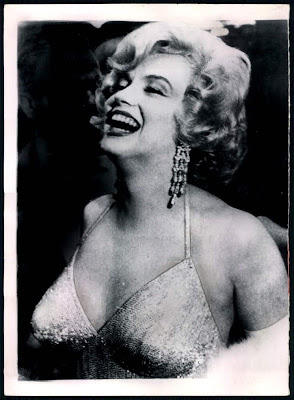




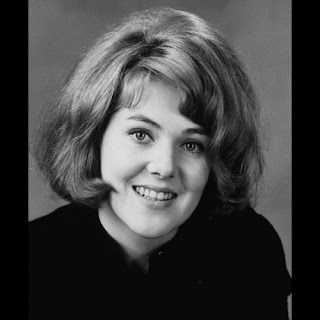







































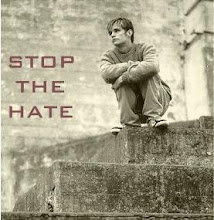




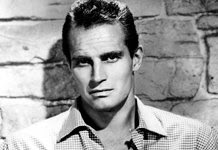

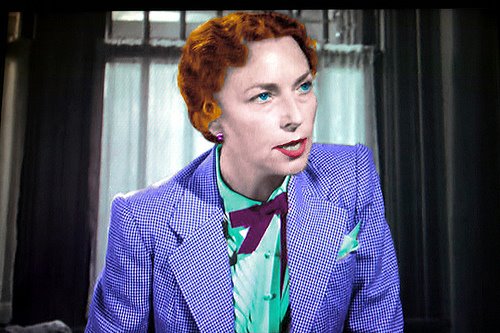



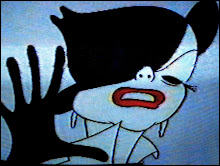.jpg)

